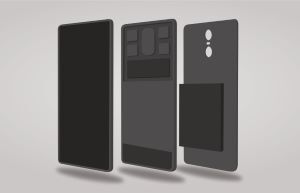Modular smartphones have the potential both to reflect technical progress through upgrades and to meet changing consumer needs. This enables a longer service life, which reduces the number of devices and their environmental impact. In order to develop the positive potential of modular design and minimize undesirable consequences, "MoDeSt" develops technical, social and economic pre-conditions and solutions for modular concepts.

Extended use-time
According to Bitkom, at least 57 million people in Germany use a smartphone in 2019. The current average service life is only two years. Smartphones contain a variety of valuable metals, but also conflict resources. Most of the environmental impact is caused by the production of smartphones.
Modular smartphones require specific user skills, such as knowledge about repair options. This enables users to absorb technical innovations through upgrades, which pave the way to longer use-times. In order to exploit the positive potential of modular design and minimise negative effects such as increased consumption, the "MoDeSt" project is investigating the technical, social and economic prerequisites for modular concepts and developing solutions for circular and socio-ecologically sound modular technologies.

Holistic approach
The innovative project involves a broad, transdisciplinary consortium. The integration of research and practice as well as technical and social science competences form the basis for a holistic approach to the research task.
The project is split into five work packages that are closely interlinked. First, conventional and modular smartphones as well as concepts are investigated and evaluated in the technical analysis with regard to various aspects of a circular economy. In the next step, life cycle assessments will be carried out which, by means of scenario building, depict different usage, repair and disposal practices and evaluate them with regard to material and resource efficiency. Thus, user expectations and practices are investigated qualitatively and quantitatively. Existing business models for modular products are analysed and new approaches are developed.
The modular approach will be further developed on the basis of these joint findings on environmental, usage and business model-related issues. Concrete technical revisions as well as the development of general eco-design criteria for modular smartphones are aimed at.

Results (Status June 2022)
Smartphones are introduced to the market with a multitude of models and variations, but there has been a clear trend in recent years: In addition to the increasingly better equipment with memory and storage, higher display resolution and battery capacity. Tthe market has developed toward significantly larger displays through better utilization of the front (screen-to-body ratio) as well as through larger, but flatter devices. Removable batteries have gone from being a standard to a niche product.
Smartphones are increasingly taking over features from other objects (e.g., alarm clocks and sound systems). Smartphones are thus modular in their role, but rather static from a technical point of view. Even sufficiency-oriented users are constantly discovering new features, then proceeding to integrate them into their everyday practices. Expectations regarding performance and features are generally high. Even ecologically-oriented users replace their devices if performance is not optimal anymore. Value-based communication, therefore, is not enough. Modular product service systems (PSS) should focus on the functional expectations and use patterns of different user groups.
In the business sector, on the other hand, participants in a workshop and survey on modular smartphones saw the main leverage primarily in the software and not in the hardware, since central approavl and updates are very important here.
Studies in the context of professional repair showed that modular smartphones have multiple advantages during disassembly and reassembly: less time required, fewer tools and tool changes, and no additional induced defects. Furthermore, hardly any preparation time is required for the initial disassembly of a model, as the disassembly sequence is self-explanatory. From an environmental point of view, it was shown that extending the use-time by repairing and upgrading peripheral parts such as cameras is worthwhile, even if it initially requires a somewhat higher manufacturing effort. From an environmental point of view, changing the battery or the display quickly pays off, so that this is still advantageous even for older devices, where economic reasons such as the current high price of spare parts often speak against it. The company SHIFT is specifically working on a functional casing that enables waterproofness and wireless charging - both aspects that are hardly to be found in easy-to-open modular devices so far.
Generally, different modular smartphone architectures are possible. These must be aligned with use patterns and business models. Similarly, PSS must also be designed in a modular manner to offer complementary services to prolong the active use time of the devices. Modularity has various advantages for all actors in the value chain. But ecological advantages are not a sure-fire success, but must become an overall strategy. Modular designs and PSS must also be supported by policymakers by taxing resource consumption to create conditions for a greater modularization of devices in supply chains and value creation models.
Involved partners and results
The transdisciplinary consortium comprises three scientific partners, Fraunhofer IZM, TU Berlin and the CSM of Leuphana University, as well as two industrial partners, SHIFT GmbH and AfB gGmbH.
The results of the project will be used to increase the distribution of modular devices on the market. They can serve manufacturers of smartphones as important development indicators. The results of the business model design can be used by manufacturers, sales partners and circular service providers to implement economic potentials of modularisation strategies and thus provide impulses for a longer service life. The results can be adapted to other product groups within the circular economy. The methods applied can provide important impulses for participatory market research in the technology/ICT sector and promote the development of integrative circular economy strategies. Within the framework of scientific publications, the results are made available for the further development of the discourse on the transition to an integrative circular economy.
Publications
Final Report (German, December 2022)
Project flyer of the funding measure (German / English) (March 2021)
The project flyers offer an insight into the contents and goals of the ReziProK projects and present first results in each case.
Project sheets of the funding measure (German) (August 2019)
The project sheets provide a brief overview of the individual projects and their goals.
Contributions to the ReziProK Transfer Conference in June 2022
Poster (German) (June 2022)
Presentation (German) (June 2022)
Contributions to the ReziProK Kick-off event in December 2019
Poster - in German (December 2019)
Presentation - in German (December 2019)
Picture credits: SHIFT 2019; Maksym Yemelyanov-stock.adobe.com; TU Berlin 2020
